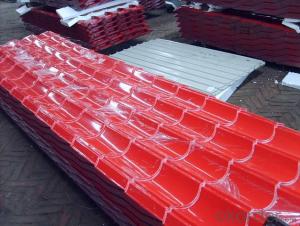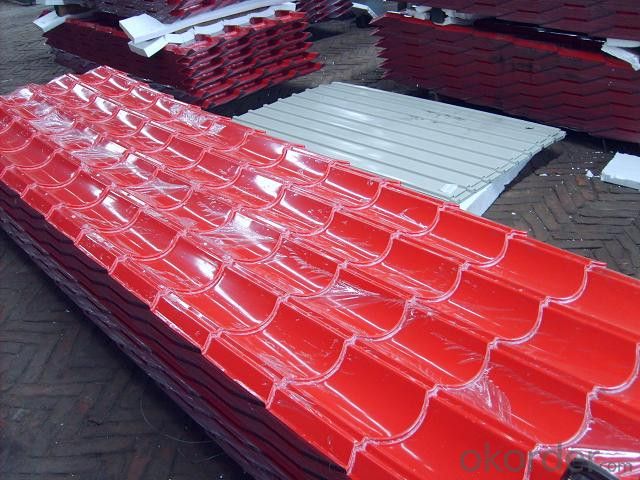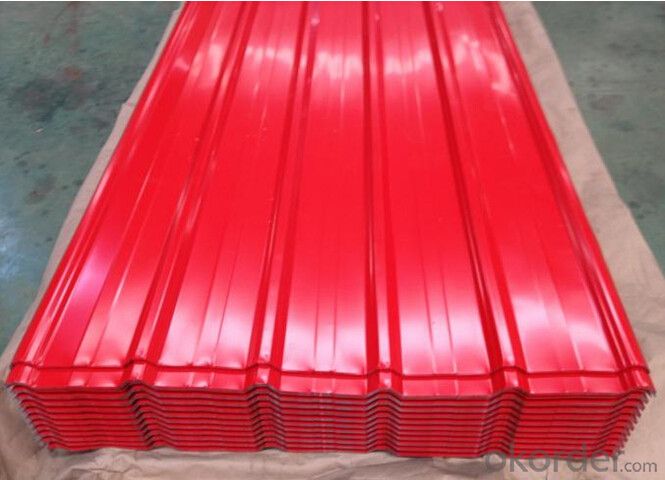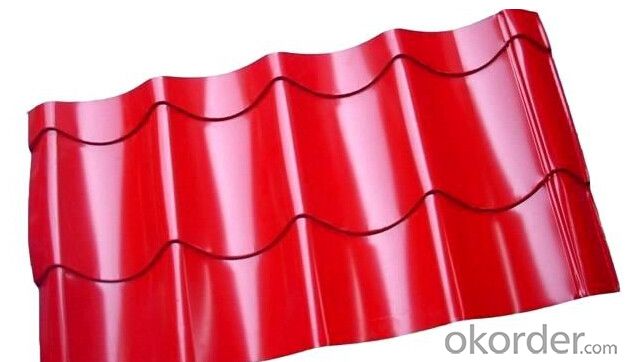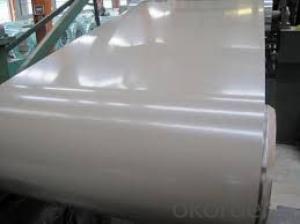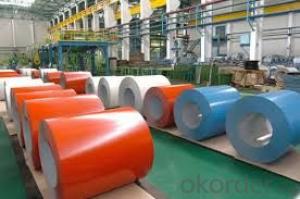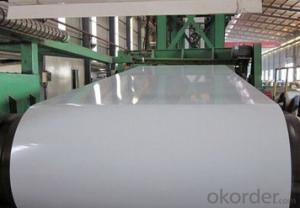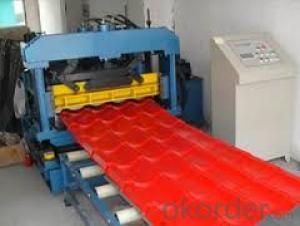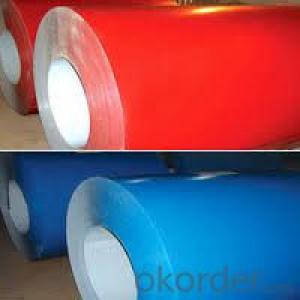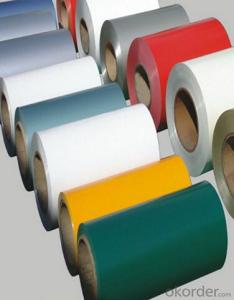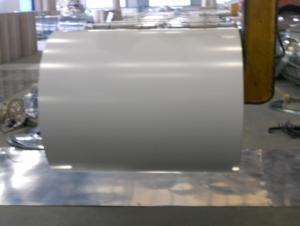prepainted Galvanized coils of Ppgi Coils
- Loading Port:
- Shanghai
- Payment Terms:
- TT OR LC
- Min Order Qty:
- 25 m.t.
- Supply Capability:
- 30000 m.t./month
OKorder Service Pledge
OKorder Financial Service
You Might Also Like
Properties
Our hot dip galvanised steels consist of a steel substrate with a metallic zinc coating applied by means of a continuous hot dip galvanising process. Metallic zinc coatings are available in steel grades ranging from steel for bending and deep drawing applications, to structural steels and high yield strength steels.
A glossy surface finish obtained under specific skin-pass conditions (either non-skin-passed or skin-passed with smooth cylinders to obtain low roughness) can be provided if required at time of enquiry.
Advantages
Hot dip galvanised products offer excellent corrosion resistance combined with very good forming properties. The coating process can apply very thick zinc layers, up to 725 g/m?(total of both sides).
Applications
Our hot dip galvanised steels can be used in a very wide range of applications for industrial markets, both indoors and outdoors. Some of the most common applications are:
Building: wide sections for roofing and cladding, doors, door frames, metallic ceilings, partitions, structural members etc
Domestic appliances: all appliances for this sector (both white and brown goods) are manufactured with hot dip galvanised steels
Miscellaneous: electrical cabinets, aeraulic components, air conditioners, road signs etc
Zinc hot dip galvanised steel is suitable for contact with foodstuffs under certain conditions, as specified in European directive 89/109/EEC and French standard NF A 36-712-1. Please contact us for further information on this subject.
1) AVAILABLE DESIGNATION OF hot dipped galvanized/galvalume steel coils
Quality | Q/BQB 440-2003 | JIS G3312-1994 JIS G3321 | EN 10326-2004 | ASTM A653-02a |
EN 10327-2004 | (BASE PLATE) | |||
(BASE PLATE) | ||||
Commercial Steel | DC51D | SGCC SGLCC | DX51D+Z DX51D+AZ | CS Type A/B/C |
Forming Steel | St01,St02,St03 | SGCD1 SGLCD1 | FS Type A, Type B | |
Drawing | DC52D /DC53D | - | DX52D+Z DX52D+AZ | DDS TYPE A/C |
Steel | DX53D+Z DX53D+AZ | |||
Structural | S280GD (StE28) | SGC400 SGLC400 | S280D+Z DX54D+AZ | SS275 |
Steel | S350GD (StE34) | SGC440 SGLC440 | S350D+Z S350D+AZ | SS340 Class1 |
2) Coated Mass OF HOT DIPPED galvanized/galvalume steel coils
zinc coat: 60gsm - 275gsm
Aluzinc coat: 60gsm - 150gsm
3) APPLICATION OF OUR HOT DIPPED galvanized/GALVALUME steel coils
Construction | Outside | Workshop, agricultural warehouse, residential precast unit, corrugated roof, roller shutter door, rainwater drainage pipe, retailer booth |
Inside | Door, doorcase, light steel roof structure, folding screen, elevator, stairway, vent gutter | |
Electrical appliance | Refrigerator, washer, switch cabinet, instrument cabinet, air conditioning, micro-wave oven, bread maker | |
Furniture | Central heating slice, lampshade, chifforobe, desk, bed, locker, bookshelf | |
Carrying trade | Exterior decoration of auto and train, clapboard, container, isolation lairage, isolation board | |
Others | Writing panel, garbage can, billboard, timekeeper, typewriter, instrument panel, weight sensor, photographic | |
- Q: I'm trying to bend stainless steel spoons, forks knives etc. for an art project. Will heating them help bend them into certain shapes or will heat only strengthen it? What is the best way to bend stainless steel?
- Refer okorder /
- Q: Brass as a rule I believe is betterhowever I do not plan to get into reloading any time soon I just want some cheap practice ammo so will steel case ammo hurt my gun (semi auto) any more than brass ammo and if so how much more?
- However okorder /.. I my self am a RCBS, Lyman and Forster fan but I do use some of the Lee crimp and necking dies because I do like the design better, as well as the lee case trimmer design. D58 Hunting with Rifle, Pistol, Muzzle loader and Bow for over 3 decades. Reloading Rifle, Pistol and shotgun for over 3 decades.
- Q: Molton is formed at 2800 F. Thats a fact. Now jet fuel at its hottest is 1800. Where does the other 1000 degress come in? And it was found at the WTC 7 site. Was this hit by a plane? A simple fire COULD NOT produce molton. This is a fact. Molton is formed during controlled demoliton of a building since all the bombs in the buiding go off and its very very hot. The fact there was MOLTON at the site is shocking to some since it is IMPOSSIBLE for molton to form from jet feul alone. Impossible. It needed another source. Now the claim that I'll get is that it weakened the stell but then we would find weak steel not molton. Why do you seem to throw this off of your shoulder? Do you not want to belive it? I'm no jet fuel guy but I know you cannot make molton by using just jet fuel. This is really proof that 9/11 was an inside job.
- I think there are things that you are missing here. First of all I looked up the MSDS sheet for Steel from US Steel. Steel is made of all kinds of different metals to start with and the melting/freezing point for steel is 1750 F not 2800 according to US Steel. In addition in the World Trade Center buildings there were all kinds of other materials that are normally used in construction that were all burning at the same time which would have added to the temperatures. Not only was it steel but it was iron, calcium and other building materials too. NIST provides a maximum gas temperature due to WTC fires of 1,000 °C: In no instance did NIST report that steel in the WTC towers melted due to the fires. The melting point of steel is about 1,500 degrees Celsius (2,800 degrees Fahrenheit). Normal building fires and hydrocarbon (e.g., jet fuel) fires generate temperatures up to about 1,100 degrees Celsius (2,000 degrees Fahrenheit). NIST reported maximum upper layer air temperatures of about 1,000 degrees Celsius (1,800 degrees Fahrenheit) in the WTC towers (for example, see NCSTAR 1, figure 6-36) Okay I don't know if you know who NIST is but that is the National Institute of Standards and Technology and they are some pretty smart people. They did not say that the steel melted due to the fires, but they did say that the temperatures surely did get high enough to to melt the steel. If US Steel says the melting point for steel is 1750 and NIST says that the temperatures were around 1800 F then that is high enough to melt the steel. I think the key is that there were other materials burning too.
- Q: What are the dimensions of steel coils used in automotive accessory manufacturing?
- The dimensions of steel coils used in automotive accessory manufacturing can vary depending on the specific application and requirements. However, typical dimensions for steel coils used in this industry range from 0.3 mm to 4.0 mm in thickness and from 600 mm to 2000 mm in width. The length of the coil can also vary, but it is commonly around 2000 meters.
- Q: How are steel coils used in the production of roofing and siding?
- Steel coils are an essential component in the production of roofing and siding materials. These coils, made from high-quality steel, undergo various processes to transform them into the final products used for roofing and siding purposes. Firstly, the steel coils are uncoiled and flattened to obtain a flat sheet of steel. This sheet is then cleaned to remove any impurities or contaminants. The cleaning process involves treating the surface of the steel with chemicals and rinsing it thoroughly to ensure a clean and smooth surface. Next, the steel sheet is coated with a protective layer to enhance its durability and resistance to corrosion. This coating can be done through various methods such as hot-dip galvanizing, electro-galvanizing, or applying a layer of metallic or organic coating. The specific coating method depends on the desired properties and aesthetic requirements of the roofing or siding material. After the coating process, the steel sheet is formed into the desired shape and profile. For roofing applications, the steel sheet is typically corrugated or formed into interlocking panels. This allows for easy installation and ensures a secure and weatherproof roofing system. Similarly, for siding applications, the steel sheet can be formed into different profiles such as horizontal or vertical panels, shingles, or shakes. Once the steel sheet is formed, it may undergo additional treatments to enhance its performance. This can include applying a protective layer of paint or other finishes to improve its appearance and resistance to fading, chipping, or scratching. The steel coils can also be embossed or stamped with patterns or textures to provide aesthetic appeal. Overall, steel coils play a crucial role in the production of roofing and siding materials. They provide strength, durability, and weather resistance, making them an ideal choice for protecting buildings from the elements. Additionally, steel coils offer versatility in terms of shape, profile, and finish, allowing for a wide range of design options for roofing and siding applications.
- Q: How are defects in steel coils repaired?
- Defects in steel coils are repaired through various methods depending on the type and severity of the defect. Common repair techniques include grinding, welding, soldering, or using heat treatment processes to correct the defects. The specific approach is determined by professionals after assessing the nature of the defect and considering the desired quality and performance standards of the steel coils.
- Q: What are the different surface finishes available for steel coils?
- There are several different surface finishes available for steel coils, including hot rolled, cold rolled, galvanized, coated, and painted finishes. Each finish has its own unique properties and benefits, such as improved corrosion resistance, enhanced aesthetic appeal, or increased durability. These different finishes allow manufacturers to meet specific requirements and applications for steel coils in various industries.
- Q: Can steel coils be stretched?
- No, steel coils cannot be stretched as steel is a rigid material and does not have the ability to be stretched like other elastic materials.
- Q: Are steel coils used in shipbuilding?
- Yes, steel coils are commonly used in shipbuilding. These coils are typically made of high-quality steel and are used in various parts of the ship's structure, such as the hull, decks, and bulkheads. The use of steel coils ensures the strength, durability, and structural integrity of the ship, making it capable of withstanding the harsh marine environment and heavy loads.
- Q: exactly what is the differance between strontuim steel and stainless steel any differances as far as hardness .... need help.
- Strontium steel is created by soaking a mild steel in strontium chromate, which has a pH of about 4 or 5, roughly the equivalent of acid rain. Chromate affects the cathodic reaction, with reduction of Cr6+ to Cr3+, and the surface film was composed of magnetite and hydrated chromium hydroxide. The Strontium is a radioactive isotope. The acid bath permeates the mild steel causing it to become mildly radioactive. Simular to oil imprengation of brass and other metals. Strontium Steel has a very high value of inhibition. However due to it's radioactive properties it is not a commonly used or manufactured material. As for where to actually obtain Strontium steel dowels. I have no idea i would speculate that you would have to purchase the raw stock and have it machined into a dowel for you.
Send your message to us
prepainted Galvanized coils of Ppgi Coils
- Loading Port:
- Shanghai
- Payment Terms:
- TT OR LC
- Min Order Qty:
- 25 m.t.
- Supply Capability:
- 30000 m.t./month
OKorder Service Pledge
OKorder Financial Service
Similar products
Hot products
Hot Searches
Related keywords
